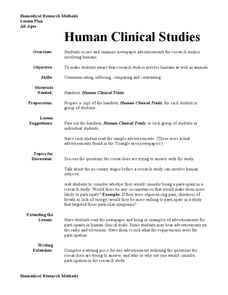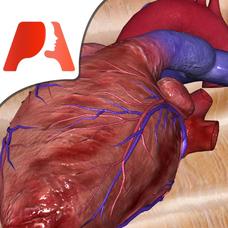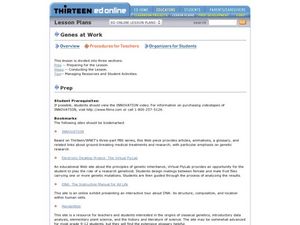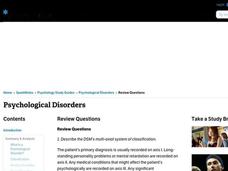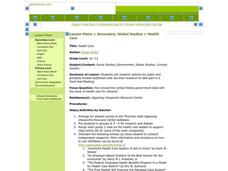College Board
2004 AP® Environmental Science Free-Response Questions
Radioactive isotopes have a wealth of uses, but their waste may cause some concern. One of four free-response questions challenges learners to devise a waste removal strategy for medical radioactive substances. Other questions address...
Oregon Education Professional Development Commission
The First Days
Designed for first-year teachers, this 116-page packet has it all. Questions you should ask administrators and fellow teachers, a checklist of things to do before school starts, a school-year calendar to record special school events and...
Curated OER
What's a Good Job?
Upper graders almost always stress about life after high school. To ease the transition to adult life, discuss how to select a job to meet personal needs. Two writing prompts are included to help learners consider what they'd like to do...
Danya International, Inc.
Life Journey through Autism: An Educator’s Guide to Asperger Syndrome
Whether this the first time you've had a learner with Asperger Syndrome in your class, or you have years of experience with learners on the autism spectrum, a booklet about the best ways to accommodate these kids in the classroom could...
Curated OER
Human Clinical Studies
A simple, yet poignant lesson gets teens reading ads for clinical trials and discussing the requirements for participation. At home, they peruse the newspaper to find current examples of similar advertisements. The purpose of this lesson...
Curated OER
Bentonville Battleground State Historic Site
Learners examine the Civil War battles of First Manassas in 1861 and Bentonville in 1865. They explore medical care in the field, how Union surgeons determined locations of field hospitals, and how battle affected nearby families
Pocket Anatomy
Pocket Heart
An all-encompassing, fully interactive, gorgeously animated model of the heart can be used to teach cardiac anatomy, physiology, and even a touch of epidemiology.
BioEd Online
Center of Gravity
Between the pull of gravity and the push of air pressure, it's a wonder animals can balance or move at all. With a hands-on lesson about the center of gravity, learners discuss their own experiences with the topic, then work with...
Curated OER
Genes at Work
Young scholars explore and discuss genetics stories and answer questions about genetic outcomes of offspring. In this genetics lesson, students read genetics stories on a web site. Young scholars use a chart to answer questions regarding...
Curated OER
Language Arts: The Doctor Will See You Now
Students are able to compare the treatments available for certain medical conditions during three different points in time during the last hundred years; list the medicines and drug therapies available now that have helped them and those...
Curated OER
Infection Control/Workplace Safety
Students role play as nurse managers in a hospital and are faced with an infection control crisis. They are to examine the feasible ways to solve and control the problem. Students utilize technology, language arts, trade and industry,...
Curated OER
Disease and Epidemics
Students explore how the study of diseases, epidemics and disease management offers opportunities for exploration of biological evolution, immune systems, interaction between humans and their environment, and interaction among organisms....
Curated OER
Waste: Where Does It Come From? Where Does It Go?
Students work together to identify sources of hazardous waste in their community. They discover the threat it poses to the environment. They examine how to properly dispose of hazardous waste as well.
Curated OER
Psychological Disorders
In this psychology worksheet, students complete 5 short answer questions on pscyhological disorders. They identify characteristics of have certain disorders.
Curated OER
Anatomy-It's Called What?
For this anatomy worksheet, students match the vocabulary term with the definition on the right. The answers are accessed through clicking the button at the bottom of the page.
Curated OER
Bioethical Issues
Students analyze and evaluate the implications of medical ethics by investigating internet resources and current bioethical issues. This lesson requires computers and internet access.
Curated OER
Disease & Epidemics
Students investigate diseases and epidemics from a biological and social perspective. They analyze the management of disease, use and misuse of antibiotics and vaccinations, and development of new treatments.
Curated OER
The Legendary Raptors
How are raptors and airplanes alike? Combine science and language arts in this fun and interactive project. Young scientists research the animal in order to design their own aircraft, and compete in a contest for farthest, fastest, and...
PBS
Stories of Painkiller Addiction: Prescription Drug Abuse Awareness Campaign
The I-STOP law was designed to regulate the distribution and tracking of prescription drugs. After reading an article about its signing and implementation, middle and high schoolers work together to come up with their own ideas for an...
PACER Center
The Peer Advocacy Guide
Teasing, mocking, and disrespect can be the hallmarks in the life of those with disabilities. Disrupt the cycle of abuse with a toolkit designed to turn peers into advocates for all those who are bullied. Everything needed to create a...
Curated OER
Health Care
Options for public and privately funded health care is a valuable debate for students to follow and learn from. They can use their research to take part in a Town Hall Meeting using facts and style. They will contact the representatives...
Curated OER
The Catcher in the Rye: KWHL Strategy
Teen depression is the focus of a KWHL activity used to consider the problems Holden Caulfield faces. Groups develop topics, research them, and use what they have learned to analyze Holden's character. A KWHL template, and a completed...
Teach Engineering
Glowing Flowers
What a bright idea! Young scientists conduct an experiment on flowers to finish the last of a six-lesson unit on Cells. Putting the stems into dye-injected water and leaving it overnight results in flowers that glow. This is to simulate...
PBS
Stories of Painkiller Addiction: Contemplating Nature vs. Nurture
Does having an addict in your family make it more likely to become one yourself? Explore the genetic risk factors, as well as the prominent environmental influences, for substance addiction in a lesson that encourages awareness and open...




